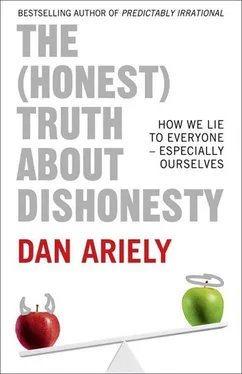Ariely, Dan - The (Honest) Truth About Dishonesty - How We Lie to Everyone – Especially Ourselves
Здесь есть возможность читать онлайн «Ariely, Dan - The (Honest) Truth About Dishonesty - How We Lie to Everyone – Especially Ourselves» весь текст электронной книги совершенно бесплатно (целиком полную версию без сокращений). В некоторых случаях можно слушать аудио, скачать через торрент в формате fb2 и присутствует краткое содержание. Жанр: Старинная литература, на английском языке. Описание произведения, (предисловие) а так же отзывы посетителей доступны на портале библиотеки ЛибКат.
- Название:The (Honest) Truth About Dishonesty: How We Lie to Everyone – Especially Ourselves
- Автор:
- Жанр:
- Год:неизвестен
- ISBN:нет данных
- Рейтинг книги:4 / 5. Голосов: 1
-
Избранное:Добавить в избранное
- Отзывы:
-
Ваша оценка:
- 80
- 1
- 2
- 3
- 4
- 5
The (Honest) Truth About Dishonesty: How We Lie to Everyone – Especially Ourselves: краткое содержание, описание и аннотация
Предлагаем к чтению аннотацию, описание, краткое содержание или предисловие (зависит от того, что написал сам автор книги «The (Honest) Truth About Dishonesty: How We Lie to Everyone – Especially Ourselves»). Если вы не нашли необходимую информацию о книге — напишите в комментариях, мы постараемся отыскать её.
The (Honest) Truth About Dishonesty: How We Lie to Everyone – Especially Ourselves — читать онлайн бесплатно полную книгу (весь текст) целиком
Ниже представлен текст книги, разбитый по страницам. Система сохранения места последней прочитанной страницы, позволяет с удобством читать онлайн бесплатно книгу «The (Honest) Truth About Dishonesty: How We Lie to Everyone – Especially Ourselves», без необходимости каждый раз заново искать на чём Вы остановились. Поставьте закладку, и сможете в любой момент перейти на страницу, на которой закончили чтение.
Интервал:
Закладка:
On Amir
On joined MIT as a PhD student a year after I joined as a new professor and became “my” first student. In that capacity, he had a tremendous role in shaping what I expect from students and how I see the professor-student relationship. In addition to being exceptionally smart, On has an amazing set of skills, and what he does not know he is able to learn within a day or two. It is always exciting to work and spend time with him. On is currently a professor at the University of California, San Diego.
Racheli Barkan
Racheli (Rachel) and I became friends many years ago when we were both graduate students. Over the years we talked about starting various research projects together, but we really only got started when she came to spend a year at Duke. As it turned out, coffee is an important ingredient for translating ideas into action, and we had lots of fun during her visit and made a lot of progress on a wide range of projects. Racheli is incredibly knowledgeable, smart, and insightful, and I only wish we had more time together. Racheli is currently a professor at Ben-Gurion University of the Negev in Israel.
Roy Baumeister
Roy is a unique mixture of philosopher, musician, poet, and keen observer of human life. His interests span everything, and his perspective often looks puzzling to me at first, but then I realize the wisdom in it and end up thinking about his views for a long while—often adopting them. Roy is an ideal person to travel and explore with. He is currently a professor at Florida State University.
Scott McKenzie
Scott was an enthusiastic Duke undergraduate when he joined the Center for Advanced Hindsight. He was highly social and had a natural knack for getting people to do what he wanted them to do, including participating in our studies. When it was time for him to pick a topic for an independent research project, he picked cheating in golf, and through the process I learned a lot about that noble game. Scott is currently putting in the consulting world.
Shahar Ayal
I first met Shahar socially through common friends and then again when he was studying for his PhD under the supervision of another friend. So when he graduated, our personal and professional paths combined and he came to spend a few years at the Center for Advanced Hindsight as a postdoctoral fellow. Over those years we got to understand each other to a deeper level and think even more alike (mostly for the better). Shahar is a delight to be with and work with, and I am looking forward to many years of joint research. Shahar is currently a professor at the Interdisciplinary Institute in Israel.
Tom Gilovich
When I was a PhD student, I attended one of Tom’s presentations, and I was amazed by the quality of his thought and creativity. Tom has a unique ability to ask important questions and find answers in interesting places. For example, he has shown that teams with black uniforms receive more penalties than their opponents; that basketball players don’t really get a “hot hand”; and that NBA players miss more free throws when they don’t think they deserve the penalty. I have always wanted to be a bit more like Tom. He is currently a professor at Cornell University.
Yoel Inbar
I first met Yoel when he was a student of Tom Gilovich and David Pizarro, and that is how we started working together. Yoel is the epitome of the modern hipster—equal parts cool and geek with a deep knowledge of indie rock bands (you probably haven’t heard of them) and UNIX. One of Yoel’s interests is disgust, and he is an expert in finding interesting ways to disgust people (fart spray, feces-shaped chocolate, odd foods, etc.). Yoel is currently a professor at Tilburg University in the Netherlands.
Zoë Chance
Zoë is a force of creativity and kindness. Talking to her is a bit like being in an amusement park—you know it is going to be exciting and interesting, but it is hard to anticipate which direction her comments will take. Together with her love of life and mankind, she is the ideal blend of researcher and friend. Zoë is currently a postdoctoral fellow at Yale University.
Bibliography and Additional Readings
Introduction: Why Is Dishonesty So Interesting?
Based on
Tim Harford, The Logic of Life: The Rational Economics of an Irrational World (New York: Random House, 2008).
Chapter 1. Testing the Simple Model of Rational Crime (SMORC)
Based on
Jerome K. Jerome, Three Men in a Boat (to Say Nothing of the Dog) (1889; reprint, New York: Tom Doherty Associates, 2001).
Jeff Kreisler, Get Rich Cheating: The Crooked Path to Easy Street (New York: HarperCollins, 2009).
Eynav Maharabani, “Honesty and Helping Behavior: Testing Situations Involving Temptation to Cheat a Blind Person,” master’s thesis, Ben-Gurion University of the Negev, Israel (2007).
Nina Mazar, On Amir, and Dan Ariely, “The Dishonesty of Honest People: A Theory of Self-concept Maintenance,” Journal of Marketing Research (2008).
Nina Mazar and Dan Ariely, “Dishonesty in Everyday Life and Its Policy Implications,” Journal of Public Policy and Marketing (2006).
Chapter 2. Fun with the Fudge Factor
Based on
Nina Mazar, On Amir, and Dan Ariely, “The Dishonesty of Honest People: A Theory of Self-concept Maintenance,” Journal of Marketing Research (2008).
Lisa Shu, Nina Mazar, Francesca Gino, Max Bazerman, and Dan Ariely, “When to Sign on the Dotted Line? Signing First Makes Ethics Salient and Decreases Dishonest Self-Reports,” working paper, Harvard Business School NOM Unit (2011).
Related readings
Jason Dana, Roberto A. Weber, and Jason Xi Kuang, “Exploiting Moral Wiggle Room: Behavior Inconsistent with a Preference for Fair Outcomes,” Economic Theory (2007).
Christopher K. Hsee, “Elastic Justification: How Tempting but Task-Irrelevant Factors Influence Decisions,” Organizational Behavior and Human Decision Processes (1995).
Christopher K. Hsee, “Elastic Justification: How Unjustifiable Factors Influence Judgments,” Organizational Behavior and Human Decision Processes (1996).
Maurice Schweitzer and Chris Hsee, “Stretching the Truth: Elastic Justification and Motivated Communication of Uncertain Information,” The Journal of Risk and Uncertainty (2002).
Chapter 2b. Golf
Related readings
Robert L. Goldstone and Calvin Chin, “Dishonesty in Self-report of Copies Made—Moral Relativity and the Copy Machine,” Basic and Applied Social Psychology (1993).
Robert A. Wicklund, “The Influence of Self-awareness on Human Behavior,” American Scientist (1979).
Chapter 3. Blinded by Our Own Motivations
Based on
Daylian M. Cain, George Loewenstein, and Don A. Moore, “The Dirt on Coming Clean: The Perverse Effects of Disclosing Conflicts of Interest,” Journal of Legal Studies (2005).
Ann Harvey, Ulrich Kirk, George H. Denfield, and P. Read Montague, “Monetary Favors and Their Influence on Neural Responses and Revealed Preference,” The Journal of Neuroscience (2010).
Related readings
James Bader and Daniel Shugars, “Agreement Among Dentists’ Recommendations for Restorative Treatment,” Journal of Dental Research (1993).
Max H. Bazerman and George Loewenstein, “Taking the Bias Out of Bean Counting,” Harvard Business Review (2001).
Max H. Bazerman, George Loewenstein, and Don A. Moore, “Why Good Accountants Do Bad Audits: The Real Problem Isn’t Conscious Corruption. It’s Unconscious Bias,” Harvard Business Review (2002).
Читать дальшеИнтервал:
Закладка:
Похожие книги на «The (Honest) Truth About Dishonesty: How We Lie to Everyone – Especially Ourselves»
Представляем Вашему вниманию похожие книги на «The (Honest) Truth About Dishonesty: How We Lie to Everyone – Especially Ourselves» списком для выбора. Мы отобрали схожую по названию и смыслу литературу в надежде предоставить читателям больше вариантов отыскать новые, интересные, ещё непрочитанные произведения.
Обсуждение, отзывы о книге «The (Honest) Truth About Dishonesty: How We Lie to Everyone – Especially Ourselves» и просто собственные мнения читателей. Оставьте ваши комментарии, напишите, что Вы думаете о произведении, его смысле или главных героях. Укажите что конкретно понравилось, а что нет, и почему Вы так считаете.












